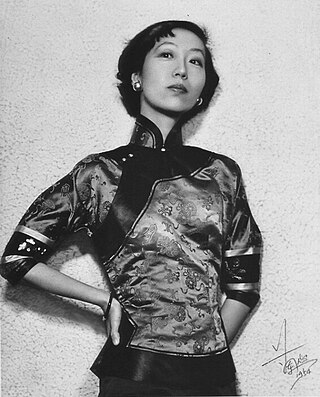
Eileen Chang (traditional Chinese: 張愛玲; simplified Chinese: 张爱玲; pinyin: Zhāng Àilíng; Wade–Giles: Chang1 Ai4-ling2;September 30, 1920 – September 8, 1995), also known as Chang Ai-ling or Zhang Ailing, or by her pen name Liang Jing (梁京), was a Chinese-born American essayist, novelist, and screenwriter.
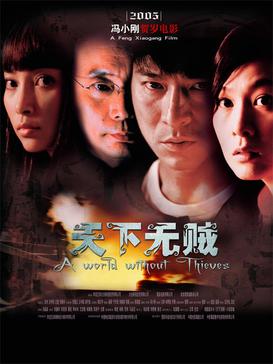
A World Without Thieves is a 2004 Chinese comedy action drama film directed by Feng Xiaogang and starring Andy Lau, Rene Liu, Ge You, Wang Baoqiang and Li Bingbing. The film is an adaptation of a 1999 novelette of the same title by Zhao Benfu. The original story is moderately different from the film adaptation. The film was first released in Shanghai, China on 5 December 2004. It clinched the 2005 Golden Horse Award for Best Screenplay Adaptation.

Hu Lancheng was a Chinese writer and politician who was denounced as a traitor for serving a propaganda official in the Wang Jingwei regime, the Japanese puppet regime during the Second Sino-Japanese War. He was the first husband of the celebrated novelist Eileen Chang.
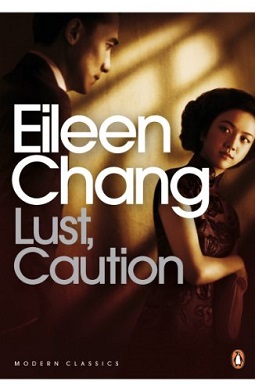
Lust, Caution is a novella by the Chinese writer Eileen Chang, first published in 1979. It is set in Shanghai and Hong Kong during the Second Sino-Japanese War. Reportedly, the short story "took Chang more than two decades to complete". The 2007 film of the same name by renowned Taiwanese director Ang Lee was an adaptation of this novel. The story focuses on the plight of Wang Chia-chih and her involvement in a plot to assassinate Mr. Yee, who is a co-collaborator of a Chinese collaborator with the invading Japanese force. The novella was allegedly based on a true story of the wartime spy Zheng Pingru. According to David Der-wei Wang, a professor of Chinese Literature at Harvard University, Lust, Caution “drew controversy thanks to a biographical subtext: it seems to project Chang's own wartime experience as a collaborator's lover”.

The Heaven Sword and Dragon Saber is a Chinese television series adapted from Louis Cha's novel of the same title. It is a final instalment of a television trilogy produced by Zhang Jizhong, preceded by The Legend of the Condor Heroes (2003) and The Return of the Condor Heroes (2006). Unlike the previous adaptations, this remake is the first to be primarily based on the third edition of the novel. The series was first broadcast on Wenzhou TV in China in October 2009.

Fox Volant of the Snowy Mountain is a 2006 Hong Kong-Chinese television series adapted from Louis Cha's novels Fox Volant of the Snowy Mountain and The Young Flying Fox. Directed by Andrew Lau and Tam Yau-yip, the series is a co-production by the Hong Kong companies ATV and TVB and Ciwen Pictures, with Wong Jing as producer, starring Nie Yuan, Athena Chu, Gillian Chung, Ady An, Alex Fong, Anthony Wong and Patrick Tam. It was first broadcast in Hong Kong on ATV in 2006.
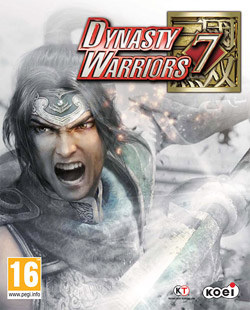
Dynasty Warriors 7 is a hack and slash video game and the seventh official installment of the Dynasty Warriors series. It is developed by Omega Force and published by Tecmo Koei. The story is based on the 14th-century Chinese historical novel Romance of the Three Kingdoms. The game was unveiled at the 2010 Tokyo Game Show. On 26 October, it was revealed at the Koei Press Conference to have improved graphics and gameplay, with the support of stereoscopic 3D. Tecmo Koei released it in North American on 29 March 2011, in Europe on 8 April 2011 and in Australia on 14 April 2011, after news that it has been delayed and was released on both the PlayStation 3 and Xbox 360. Tecmo Koei Japan had released Dynasty Warriors 7 with Xtreme Legends, along with downloadable content up to October 2011 released on PlayStation 3 version, on Microsoft Windows. It was later released worldwide in December 2018 via Steam as Dynasty Warriors 7: Xtreme Legends Definitive Edition.
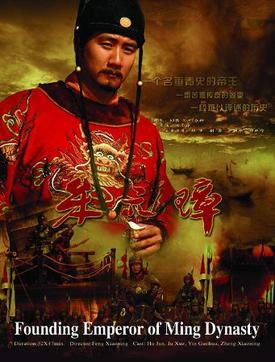
Founding Emperor of Ming Dynasty is a Chinese television series based on the life of Zhu Yuanzhang, the founding emperor of the Ming dynasty. Directed by Feng Xiaoning and starring Hu Jun as the Hongwu emperor, the series was first aired on CCTV in China in 2006.

The Rice Sprout Song is a 1955 novel by Eileen Chang. It was her first attempt at writing fiction in English and with it, she addresses political issues relevant to early 20th Century China in a far more direct approach than she was ever akin to. The novel depicts the extreme ruthless nature of the land redistribution movement of the Communist regime. The novel highlights the horrors and suffering it caused a southern agrarian village in early 1950s China and hinges on the lives of a large family of peasant landowners in the countryside. In doing so, the novel portrays several elements of a traditional Chinese family structure and the prominent culture of that era. The novel portrays the various and severe implications that the larger political institutions surrounding them impose, primarily the famine that led to the subsequent suffering of the peasants. It describes the desperation of ordinary farmers in the face of hunger in detail, and by analyzing the causes of hunger, highlights the contradiction between farmers' needs and government control, as well as the conflict between human nature and system. In the novel, there is also the cultural and organizational construction of the government in the countryside. Although it is also a means for the government to control the countryside, it obviously has no distinct theme of "hunger" because of its social progress.

King's War, also known as Legend of Chu and Han, is a Chinese television series based on the events in the Chu–Han Contention, an interregnum between the fall of the Qin dynasty and the founding of the Han dynasty. It started airing on Anhui TV, Zhejiang TV, Jiangxi TV and Tianjin TV on 28 December 2012.
The Sing-song Girls of Shanghai, also translated as Shanghai Flowers or Biographies of Flowers by the Seashore, is an 1892 novel by Han Bangqing.

The Seven Heroes and Five Gallants is a 1994 Taiwanese television series produced by Chinese Television System (CTS) a few months after its prequel Justice Pao, which was also produced by Chao Ta-shen. Dozens of actors appeared in both series, but only Sze Yu and Tu Man-sheng reprised their roles. Fan Hung-hsuan and Lung Lung chose to portray new characters rather than their iconic roles.

Legend of Nine Tails Fox is a 2016 Chinese television series based on six tales in Strange Stories from a Chinese Studio by Pu Songling. It originally aired two episodes daily on Hunan TV, Sunday through Tuesday at 22:00, as well as being simultaneously broadcast online on Youku, Tencent, Sohu and iQiyi. The drama was directed by Liu Yufen, Gao Linbao and Xu Huikang, and stars an ensemble cast of actors. The drama is separated into six plots, based on the corresponding stories in the Strange Tales from a Chinese Studio.

April Rhapsody is a 2000 TV series written by Wang Hui-ling, based on the romantic life of Xu Zhimo, one of China's most renowned poets in the 20th century.

Zheng Pingru was a Chinese socialite and spy who gathered intelligence on the Imperial Japanese Army during the Second Sino-Japanese War. She was executed after an unsuccessful attempt to assassinate Ding Mocun, the security chief of the Wang Jingwei regime, a puppet government for the Japanese. Her life is believed to be the inspiration for Eileen Chang's novella Lust, Caution, which was later adapted into the eponymous 2007 film by Ang Lee.
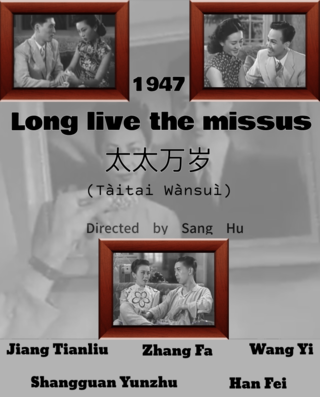
Long Live the Missus! is a 1947 Chinese romantic comedy film known as one of the best comedies of the civil war era. The film was directed by Sang Hu with a screenplay written by the famous Chinese literary figure Eileen Chang; the pair also collaborated on the 1947 film Unending Love. The film was produced in Shanghai by the Wenhua Film Company. Long Live the Missus! offers a satirical depiction of the lives of women, male-female relationships, and the institution of marriage in 1940s Shanghai.
Bu Liao Qing is a 1947 Chinese film directed by Sang Hu and written by Eileen Chang.

Changde Apartment, formerly known as Eddington House, is located at 195 Changde Road, Jing'an District, Shanghai, close to Nanjing West Road and Yuyuan Road. The apartment was built on Hede Road, Jing'an Temple Road in 1936. It consists of eight floors and is decorated in an Art Deco style. It was originally the property of the Italian Raoul Faith and the majority of its occupants were middle to upper class people. In 1994, Changde Apartment was designated among the second batch of outstanding historical buildings in Shanghai.
Red Rose, White Rose, is a novella by Eileen Chang, one of the most well-known authors in modern Chinese literature. The novel was first published in 1944 and later included in her short-story collection Chuanqi. In 1994, Hong Kong director Stanley Kwan adapted the novel into a movie of the same name Red Rose White Rose, which was widely acclaimed and entered into the 45th Berlin International Film Festival.















